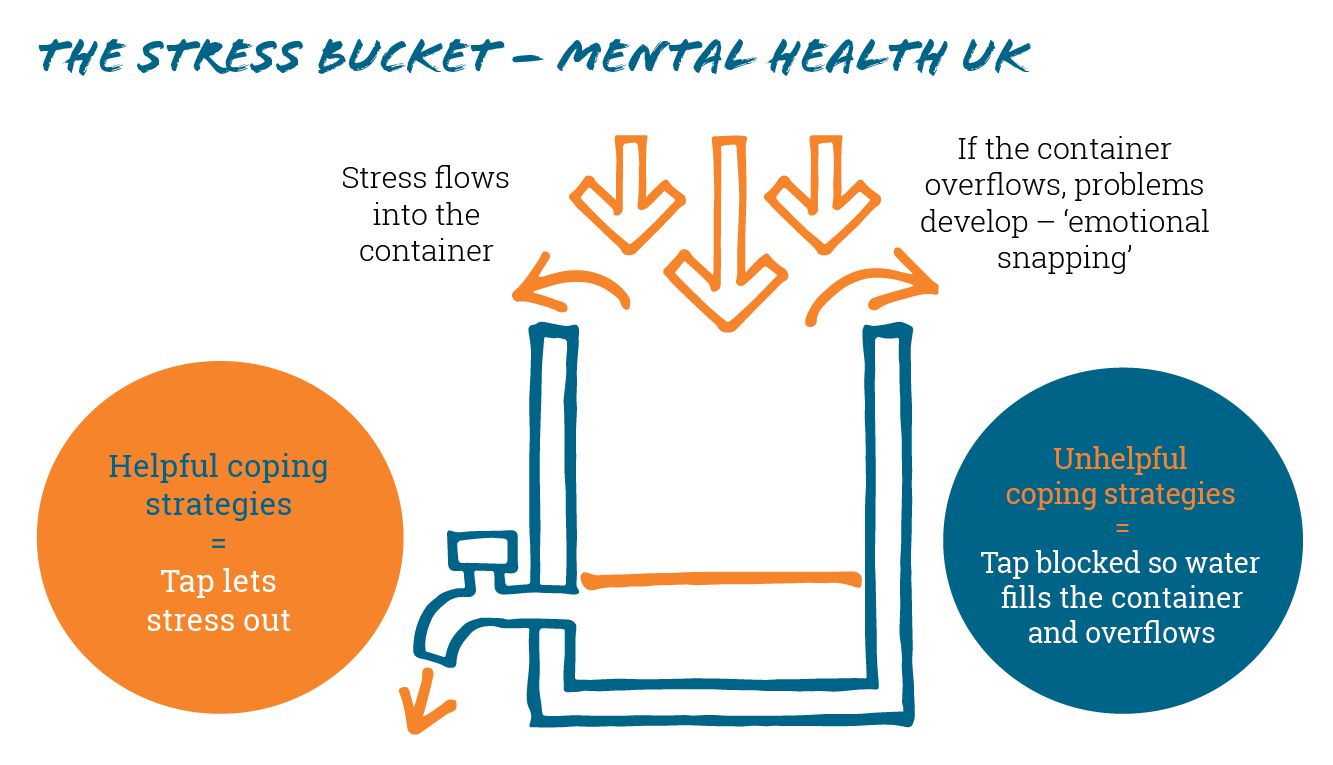How full is your stress bucket?
April 18 2024

Stress has been described as a modern-day epidemic, with one in five people in the UK feeling stressed more days in a month than they don’t.
Can stress ever be good?
Stress is not necessarily a ‘bad’ thing. Without the ability to feel stress, the human race wouldn’t have survived.

The brains and bodies of our cave-dwelling ancestors reacted when faced with threats such as a sabre-toothed tiger: the sympathetic nervous system was triggered, blood pressure and heart rate increased, muscles tensed, as they prepared for ‘fight or flight’. That energy rush helps us focus our attention so we can respond quickly.
10,000 years later, we experience stress very differently, and our stressors are far more complex. From childhood onwards, we can face pressure from being labelled either a ‘failure’ or a ‘success’; we strive to do well, get a good job, look a particular way, fall in love. When reality doesn’t meet expectations, we may feel something is wrong – with others, the world or ourselves.

Fight, flight, freeze, flop!
We are hard-wired to focus on perceived threats.
We’re also more likely to think negatively when stressed.
Those negative thought patterns – ‘It’s all too much’ or ‘I can’t cope’ – can lead to behaviour changes that cause problems.
These include:
- Fight: becoming more irritable and prone to emotional outbursts.
- Flight: avoiding difficult situations, worrying, difficulty relaxing.
- Freeze: difficulty making decisions, compulsive checking of social media.
- Flop: withdrawal, inactivity and low mood.
These responses evolved as a way of surviving danger but problems arise when they take over our life. We can get locked into one or more of them as a coping mechanism, in ways that aren’t appropriate to the current situation.
Effects on body and mind
We need a certain amount of stress to perform well. It takes us from an under-stimulated state to a level of alertness necessary to achieve our goals. Stress allows us to face the day’s challenges feeling sharp and focused.
However, when stress gets too much for us, we can feel panicked and fatigued.
We need a certain amount of stress to perform well. It takes us from an under-stimulated state to a level of alertness necessary to achieve our goals.
It can affect our immune system, sleep pattern, short and long-term memory, capacity to learn and relationships. Ongoing stress can cause serious physical problems such as heart disease, migraine and ulcers. It’s not a mental health condition in itself, but if it’s intense and persistent, it can lead to mental health problems such as anxiety and depression.
Resilience – an antidote
Resilience can be an antidote to stress. Resilience is our ability to manage or tolerate ‘ordinary’ distress, including disappointment and failure; to normalise difficult feelings and see beyond them; and our ability to have confidence in our own resources to help us cope.
The past can affect how we feel and behave. Our successes, setbacks, losses, and the support or criticism we’ve received all influence how we respond to stressful situations and behave in the face of adversity.

This is particularly true if we’ve had challenging or traumatic times growing up.
We all differ in our capacity to manage stress. Imagine your stress level as a ‘bucket’. Some of us have a large bucket, which can hold a lot before overflowing.
Others have a much smaller bucket, which will be full to the brim sooner. Now imagine a tap on the side of the bucket that lets stress out he so it doesn’t overflow. The tap represents strategies to help reduce your stress levels, for example the STOPP technique:
Stop – as soon as you notice you’re feeling stressed or overwhelmed, stop what you’re doing.
Take a breath – focus on your breathing: take a deep breath, hold and release.
Observe – ask gently and without judgement: what am I thinking? What am I reacting to? What am I feeling?
Pull back – see the bigger picture and put the situation in some perspective. Is this fact or opinion?
Practice what works – find what works for you and focus on practising this.
Young people and stress
We can experience stress at any life stage.
Children and young people may experience stress at school, for example when taking tests; stress at home, due to parental separation, poverty or family expectations; or from the news.

In a 2018 survey, 60 percent of young people aged 18-24 said they had felt so stressed by pressure to succeed that they felt overwhelmed or unable to cope. 49 percent had experienced significant stress in relation to body image and worries about their appearance, and 39 percent had had suicidal feelings due to stress.
The survey shows just how vulnerable young people are to mental health problems. Given that three quarters of mental health problems are established by the age of 24, it is vital that young people receive the best mental health education to promote their wellbeing and resilience.
Promoting wellbeing
Here are some steps for managing stress and promoting our wellbeing:
- Eat well: the brain and body need the right kind of fuel for mental wellbeing and the immune system. Eat a ‘rainbow’ of foods and drink plenty of water (ideally six to eight glasses a day) – even slight dehydration leads to increased anxiety.
- Exercise regularly: exercise is crucial for wellbeing and a well-functioning immune system. The best form of exercise should be something you enjoy!
- Sleep well: A regular sleep schedule makes a big difference, as does having sufficient exposure to daylight and avoiding caffeine later in the day. Set up a ‘wind down’ routine, such as a warm bath before bed and/or reading in bed, and try to avoid devices for at least 60 minutes before bedtime.
Kirsty, our Office and IT Coordinator, shared her experience of stress in a previous workplace:
Related
Popular
Upcoming event

Join us for the Bath Half Marathon to support young people and their mental health!

The Charlie Waller Trust
The Charlie Waller Trust is a registered charity in England and Wales 1109984. A company limited by guarantee. Registered company in England and Wales 5447902. Registered address: The Charlie Waller Trust, First Floor, 23 Kingfisher Court, Newbury, Berkshire, RG14 5SJ.
Copyright © 2025 The Charlie Waller Trust. All rights reserved.






